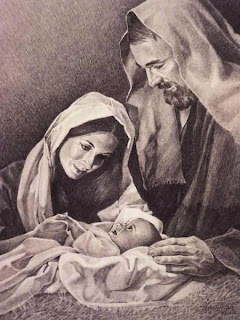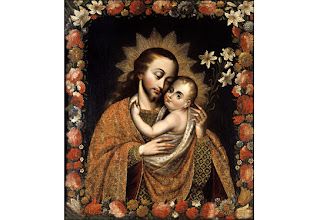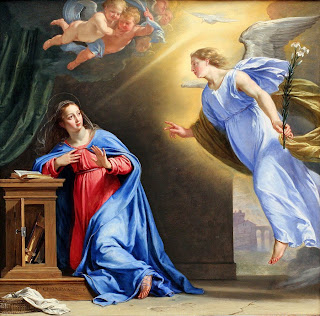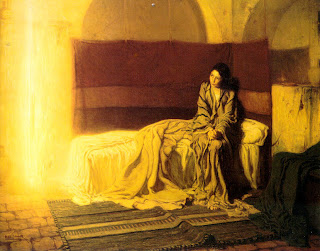Now that Christmas Day is here the season of Advent has ended, and the Christmas Season has begun.
This Blog will probably lie idle now until Advent 2009, but you can still contribute a comment if you wish.
My Main Blog will continue to follow my thoughts and activities as I continue towards the end of my training. Feel free to join me for the journey.
There's a new entry there today - for Christmas Day itself, the start of the Christmas Season.
Thank you for dropping in to my Advent Blog. I wish you a Happy Christmas, and a Fruitful 2009 when it arrives.
Bye for now.
Thursday, 25 December 2008
Sunday, 21 December 2008
Advent - The Baby

The story of Jesus’ birth is a very short story. Only Matthew and Luke’s Gospels record details. John declares that Jesus was the Word of God and he “became flesh”. Mark doesn’t refer to the childhood or origin of Jesus at all.
Luke’s Gospel gives us the most detail about the actual circumstances of Jesus’ birth, with Matthew adding in some other details not included by Luke. Matthew tells us of Joseph’s angelic dream, the visit of the Magi, or Three Wise Men, and the flight to, and return from, Egypt. The rest of the Christmas story comes from Luke.
Although both writers tell us about miraculous events surrounding the birth of Jesus, it seems clear that the birth of Jesus was a normal, natural, human birth.
Given that this was the arrival on Earth of the God who created the Universe - it was surprisingly normal. Why did God bother with making Mary pregnant, waiting for nine months, the hazards of childbirth itself, and then another 30 years of growing up, before Jesus’ ministry began?
Why didn’t God just become a fully adult person ready to begin his ministry? It would saved a lot of risk and waiting about.
But God didn’t take the easy way. He never has. After all, he has been waiting for 13.73 ± 0.12 billion years! (according to Hinshaw et al). What’s wrong with waiting another few months.
And as for risk - well actually God doesn’t need to worry about risk. God has the resources to ‘try’ as often as he likes! Just because we only know about the incarnation of God as Jesus doesn’t mean that he didn’t have any previous attempts.
But as it was, Jesus survived the hazards of birth, and of growing up, and accomplished his Mission, to Save the World. And the Early Church, who followed on with Jesus’ ministry, played their part too, in spreading the Gospel around the Globe.
But that makes me wonder - why did God choose that time, away back 2000 years ago, to come amongst us in Jesus? It was such a significant event that the whole world now counts its years from that momentous occasion (apart from a few groups that choose to run their calendars alongside the global calendar).
I agree that it was a good time - when the Roman Empire was nearing its maximum power and extent. Within a few tens of years the entire Empire had heard of Jesus Christ, although it was not until 312AD that Emperor Constantine converted to Christianity and the Church became an officially recognised institution.
But wouldn’t today have been a better time?
In these days - when it seems that a fly gets indigestion in Timbuktu and the whole world hears about it in 5 minutes flat (well that’s maybe a slight exaggeration!).
But you know what I mean. Whenever anything of significance happens, the news media, and the internet, have their Breaking News headlines flashed all over the screens and the airwaves. In just a few hours everybody knows - unless they are unable or unwilling to engage with this news-rich culture that we live in.
But maybe that would be a disadvantage too. After all, Jesus had three years of team-building with his disciples before it came to Crunch-time. And then he had another 50 days before he Ascended and left them on their own (apart from the Holy Spirit - a not-inconsequential aide!).
In today’s news hungry age, Jesus’ ministry would have been plastered all over the front pages every time anything unusual happened. He would have been forced to the climax in weeks never mind years.
Look what happens to today’s self-proclaimed Messiah’s. I’d better not mention any by name - but you can probably think of a few of them. They are promoted, ridiculed, forced to justify themselves, and then ritually humiliated, and finally discredited and ignored. The whole process can be complete in just a few short months.
Politicians can suffer the same roller-coaster ride. And we have seen a few of them have their ups and downs. Barack Obama is currently on the up. But no-one is perfect, and his first slip-up will surely result in a massive down-slide - just as we have seen with Gordon Brown too.
So perhaps today’s time would not have been such a good time for the Messiah to arrive. After all, the Church is finding it hard enough to make it’s voice heard. And there are millions of us.
There was only one of Jesus, and a few tens or hundreds of his followers. They would have submerged in today’s culture. Just imagine if there was only one Church, and it had only 400 to 500 members, just like the Early Church. How would you have felt being a part of that group?
What would you do? What could you do?
It would be like starting all over again, wouldn’t it?
You would have to go back to the basics.
Basics with a capital ‘B’.
So as we think about that first Christmas Morning, and the arrival of a new baby, the baby Jesus, let’s think what our response is to that arrival.
Are we going to leave it to others to make the appropriate response? Or will we go out into the streets and shout it out loud - the way the Christmas Shepherds did, telling everyone they met. Or the way the Wise Men did - we have seen his star - and we have come to worship him - help us to find him.
Jesus was born in a stable, and laid in a manger. There was no room for him in the inn. There was no money for a hotel or a palace. It was just Mary, Joseph, and Jesus - and a kindly Father making sure everything turned out OK in the end.

Sunday, 14 December 2008
Advent - The Man

“Joseph son of David, do not be afraid to take Mary home as your wife, because what is conceived in her is from the Holy Spirit. She will give birth to a son, and you are to give him the name Jesus, because he will save his people from their sins.” (Matthew 1:20-23,TNIV)
Although Mary doesn’t get a lot of coverage in the Gospels, her husband Joseph gets even less!
He is only mentioned at the beginnings of Matthew’s and Luke’s Gospels, John’s Gospel only mentions him once, and Mark’s Gospel doesn’t mention him at all!
It’s quite remarkable - for the Jewish society was very patriarchal. We get some sense of that in the genealogies of Jesus, in Matthew chapter 1 and Luke chapter 3. Both lists contain details only of the men, except for some of the female heroes of the Jewish nation.
So why is it that Joseph has such a low profile?
Perhaps one reason is that Joseph had gone before Jesus’ ministry began. We don’t know whether he died of an illness, or an accident, or from a violent act, or even if he just abandoned the family. The latter seems unlikely, but such a despicable act may explain the silence in the Gospels about his departure.
Another possible reason is that Joseph was a carpenter or builder. It’s not a high-status job building houses. On one occasion in Matthew’s Gospel (13:55), when Jesus is in his home town of Nazareth, Jesus is described disparagingly as the ‘Carpenter’s son’.
‘Ah kent his faither - and he wisnae worth much.’
Joseph must have been present until recently for him to be used as a family reference for Jesus.
However, one of the unusual features of the early church was its willingness to grant status and authority to women. Several congregations are described as being led by, or meeting in the house of, one or more women.
They didn’t feel the need to make Jesus' father a hero figure. They were content for his mother Mary to be the parental heroine. After all, she was the one whom God had made pregnant. Joseph was just a spectator, or a bystander.
But Joseph did play a big part in the life of Jesus. He had had every right to reject Mary and send her hame.
He had decided to do so, and it was only the intervention of the angelic dream that persuaded Joseph otherwise. So he took Mary as his wife, and cared for Jesus and their growing family.
Joseph was certainly still present when Jesus was twelve years old, for Luke tells us that his parents took him there for their annual visit. Jesus got left behind and they found him in the temple debating with the elders.
That was the last time we hear of Joseph in person other than the references to him being Jesus’ faither, as was commonly thought.
In human terms we might be sad that he never lived to see Jesus’ triumphant ministry and his victorious death and resurrection.
On the other hand, I am confident that Joseph 'earned' his way into God’s eternal Kingdom. I am sure that he was waiting with open arms to embrace ‘his’ boy, the son of Mary, who was also the Son of God.
He may not have been Joseph’s son, but I am sure that Joseph regarded him as his boy. They must have had a wild party when they met again. Builders certainly know how to celebrate!
In our present days, when a woman can be a surrogate mother on behalf of another woman, it is interesting to consider that Joseph may have been one of the first surrogate fathers.
Perhaps he was the first surrogate father to know who the real father was!
Whatever the facts of Joseph’s life and death, one thing is sure. We owe Joseph an enormous debt of gratitude, for standing by his fiancé Mary, and for bringing up Jesus safely and securely.
Hail Joseph!

Sunday, 7 December 2008
Advent - The Woman

Mary is usually thought of as a young woman, probably in her teens. She was engaged to be married to Joseph. She was part of a typical large Jewish family. Elizabeth was her elderly relative, perhaps an aunt or a cousin. Life was normal.
Then Gabriel appeared on the scene.
She was afraid, and no doubt that trepidation continued throughout her life. If Jesus was to be who Gabriel said he was to be, then what would happen to him, and what would happen to her.
It’s hard enough today, when young women get pregnant before they have even chosen their life-partner.
What will my parents say? What will my boy-friend say? What will my friends say? What will my neighbours say? What will the minister say? (Maybe that question doesn’t get asked so often these days!).
At least nowadays single mums have access to many more options than in Mary’s day.
Mary went to stay with Elizabeth. And it must have been a tremendous relief to Mary when Elizabeth prophesied about Mary’s baby growing in her womb.
Yet life continued, and continued to be hard. Mary & Joseph were travelling and only just reached Bethlehem before she went into labour.
It was not long afterwards when the couple were warned to flee to Egypt. When it was safe they then returned to Nazareth to live.
All that travelling was undertaken in the hardships of the day. There were no planes, trains, or cars. They could only take what they could load onto a donkey train.
As a builder Joseph would be able to make a living, but not a grand living.
As Jesus grew up he too learned the trade and became a builder.
Often our English translations describe Jesus as a carpenter, but the Greek word, τεκτων (tekton), also means a builder. Paul is described as a master-builder, an αρχιτεκτων (arcitekton), a first-builder, master-builder, from which we get the word architect! Just think how many of Jesus’ stories were about stones or builders.
Looking after the house for a family of builders would not be an easy task. Dust, dirt, dirty clothes, torn clothes, huge appetites, boisterous behaviour, and who knows what else.
No doubt about it, Mary’s life would have been a hard one.
And when Jesus’ ministry started at the age of 30, Mary was already on her own.
Jesus, as first-born, had been head of the household after Joseph’s death. But now Jesus too had gone away, and another brother would have taken on that responsibility.
And Mary had to cope with her worry about what would happen to Jesus. He had given up a respectable job, if not a high-earning job, and now he had become a wandering rabbi with no regular income. Anything could happen to him. Huge crowds surrounded him.
Controversy surged through the gossip-tellers. Conflict with the religious authorities, and potentially the Romans too. Who knows where it would all end.
And end it did. Jesus’ life began in the crudest of circumstances, born in a stable, and laid in a manger. At his death he had nothing. Even his clothes were distributed amongst the soldiers.
And Mary was once more cast into the care of another - this time one of Jesus’ disciples, John.
Jesus and Mary loved each other, all the way to the bitter end.
It must have been even more confusing and upsetting for Mary when stories of Jesus resurrection began to circulate. But she treasured up all her memories and stories about Jesus and passed them on to his friends and eventually the gospel-writers.
So we know the story today, of the birth in a stable, the visit of the shepherds, and the Wise Men, or Magi.
No wonder Mary is treasured by so many Christians throughout the ages.
But she was only human, not divine. The mother of God, but not God herself. So it is Jesus that we worship, and not Mary, despite the respect that we may have for all that she accomplished.

Wednesday, 3 December 2008
Advent - In the Beginning - Who was Jesus?
The Creation of the Universe was a secret event. No-one was there to witness or record it. We don’t know what it looked like, and we can never find out. It will be forever a mysterious event.
Similarly the birth of Jesus was a secret event. It began with a mysterious, miraculous conception. It was hidden, secret, we can never find out what happened or how it happened. Even the fact of the Virgin Birth is a matter of dispute, or disrepute, or trust, or faith.
Even more mysterious is the co-existence of God and Man in Jesus. It took the early church hundreds of years to wrestle with this duality in Christ. Some argued that he was wholly divine - but then his death was not a human death and neither was his life a human life. It only appeared to be so. Others argued that Jesus was only human and not divine at all. Some groups on the fringes of Christianity still believe that today.
The early church convened several Councils to wrestle with the various beliefs and rule on the truth of the matter. At Nicaea in 325AD they produced the Nicene Creed which declared that God and Christ were the same. But this was not a clear statement and the dispute rumbled on until the Council of 451AD at Chalcedon which declared that Christ was perfect God and perfect man, those two natures being in one person.
That’s a shorthand description of the Council’s deliberations about the nature of Christ but clarifies for us that Jesus of Nazareth was fully divine and fully human. He was born as a human baby, of a human mother Mary, grew up in a normal, unremarkable childhood, until the age of 30, when he was baptised by his second cousin John the Baptist, who was born to Elizabeth some 6 months before Jesus was born. His three year ministry culminated in his crucifixion, resurrection, and ascension, after which the Holy Spirit was given to all believers at that first Pentecost.
Who was Jesus? He was Man and God, and he lived, died, and rose again, in our midst.
Similarly the birth of Jesus was a secret event. It began with a mysterious, miraculous conception. It was hidden, secret, we can never find out what happened or how it happened. Even the fact of the Virgin Birth is a matter of dispute, or disrepute, or trust, or faith.
Even more mysterious is the co-existence of God and Man in Jesus. It took the early church hundreds of years to wrestle with this duality in Christ. Some argued that he was wholly divine - but then his death was not a human death and neither was his life a human life. It only appeared to be so. Others argued that Jesus was only human and not divine at all. Some groups on the fringes of Christianity still believe that today.
The early church convened several Councils to wrestle with the various beliefs and rule on the truth of the matter. At Nicaea in 325AD they produced the Nicene Creed which declared that God and Christ were the same. But this was not a clear statement and the dispute rumbled on until the Council of 451AD at Chalcedon which declared that Christ was perfect God and perfect man, those two natures being in one person.
That’s a shorthand description of the Council’s deliberations about the nature of Christ but clarifies for us that Jesus of Nazareth was fully divine and fully human. He was born as a human baby, of a human mother Mary, grew up in a normal, unremarkable childhood, until the age of 30, when he was baptised by his second cousin John the Baptist, who was born to Elizabeth some 6 months before Jesus was born. His three year ministry culminated in his crucifixion, resurrection, and ascension, after which the Holy Spirit was given to all believers at that first Pentecost.
Who was Jesus? He was Man and God, and he lived, died, and rose again, in our midst.
Subscribe to:
Comments (Atom)